5 ways total strangers can make your trip better
NEW YORK — I love to travel alone for one very particular reason: The strangers I meet. The conversations we have and their unexpected turns send me deep into the places I go, far beyond skimming the surface lightly.
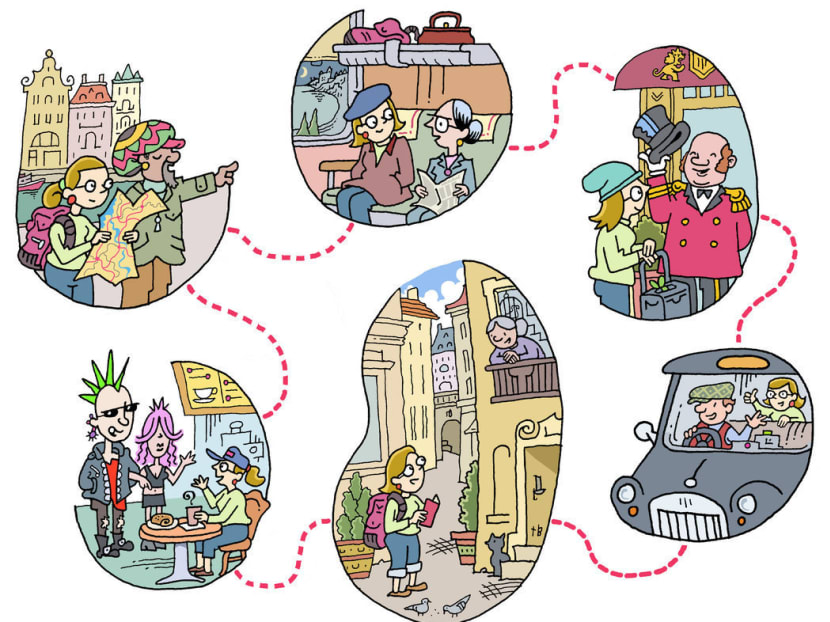
There's an upside to talking with strangers when you travel. Art by Tom Bloom
NEW YORK — I love to travel alone for one very particular reason: The strangers I meet. The conversations we have and their unexpected turns send me deep into the places I go, far beyond skimming the surface lightly.
I talk to people who live there, travelers, anyone with a story, anyone who may turn my path a different way from what I had planned. These encounters are what cement my memories of a place, and my relationship to it.
Once on an overnight train from Frankfurt to Milan, I shared a cabin with a prim German woman from outside the city, maybe in her 70s, clutching a newspaper. As we waited for the train to depart, I said hello. I asked her if it was a good newspaper, and got a rundown of the merits and failures of a dozen publications. Soon we settled into our separate preoccupations to signal the end of the conversation. I was in the wrong time zone. I fell asleep before the light faded.
Hours later, I woke up to a gentle nudge and a whisper. “Are you awake? You must come down.” She beckoned me to the window. The train was on a slow arc around the shore of a vast black lake. There were a few towns like scattered bits of moonlight, broken loose from the great glowing strip across the still surface of the water. Hard by the edge of the lake, a mountain in the form of a massive shadow rose up into the charcoal mist.
“It’s Lake Como,” she told me. “It’s terribly expensive here now. But my sister-in-law has a small place that was left to her by her godmother. We visit sometimes. I would stay forever if I could.” She paused; I waited. “What a moon. Isn’t it the most beautiful thing you’ve ever seen?”
It was, and it still is. And had I not made a small connection with her, I would never have seen it. She would never have thought to wake me, never dropped her formality and spoken wistfully of her wishes.
Talking to strangers along your travels can change your trip into an adventure. It can take you into the unknown, unexpected hearts of places and people, trading what is planned and predictable for what may turn out to be sublime. One note: This is territory for adults to traverse * an important caveat is that it is not for children or teenagers.
Here are five rules of thumb to guide you into such adventure.
GO ALONE, AND DITCH YOUR PHONE.
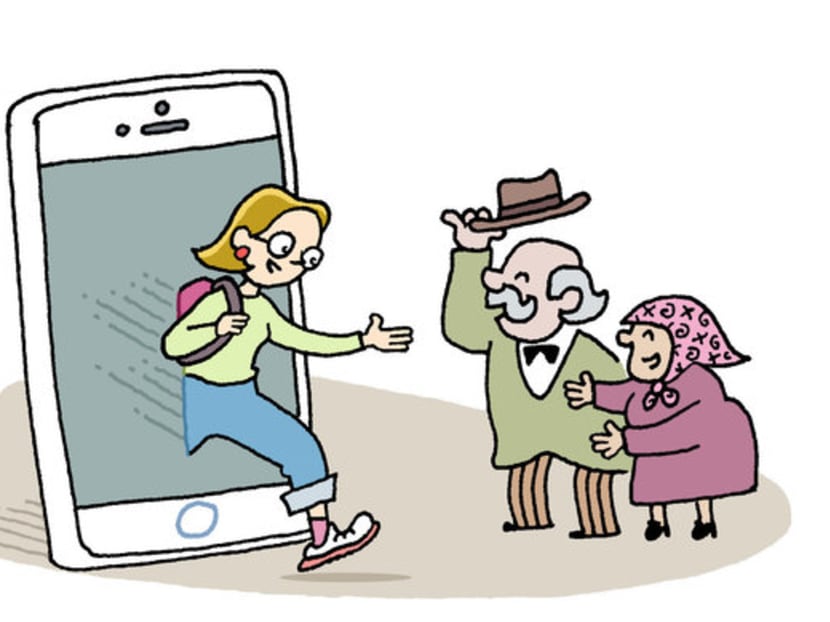
The absolute precondition is that you be by yourself. If you’re traveling with others, set aside a Stranger Day to try this out. You need to be an open person * with open body language and open eyes, without the shield of another person, and without the shield of your phone. If ditching it isn’t viable or feels unsafe, take a deep breath and make a sacred deal with yourself not to touch it. Put it in the bottom of your bag or in airplane mode to be used only in emergency. Put it in a different pocket, tie a string around it or cover it with tape to remind you to put it away every time you reach for it.
It’s essential, because our phones constantly draw our unmediated attention from the world around us. The world through the phone is its own experience, and has its own pleasures, including sometimes a sense of communion and community. Here you want something different. Your phone will get between you and your surroundings, and you’ll miss so many chances to make eye contact with the people you see. It’s the antithesis of being present.
USE AN OLD-FASHIONED PAPER MAP — OR NOTHING AT ALL.
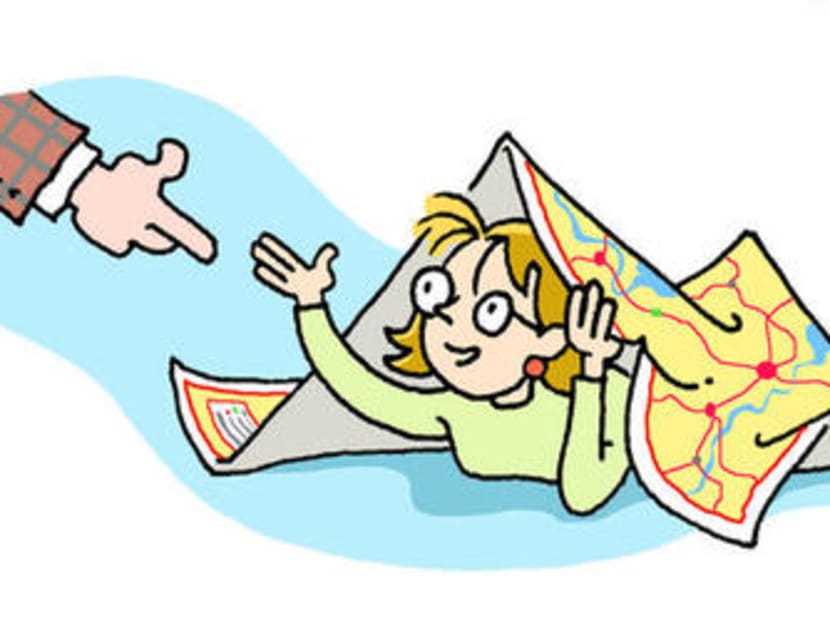
On a visit to London for a conference a few years ago, I decided to skip paying for a data plan. The result was ridiculous, and also delightful. My first night out, I checked Google maps on my laptop before I left and sketched directions to the large dinner gathering I was to attend. I emerged from the tube and got hopelessly lost. I had forgotten to write down the name of the restaurant. The small street in the address was nowhere to be found. It began to rain. I asked a man outside a bar where the street was. He had no idea, but shooed me inside to keep dry. No one else knew either, so I had dinner on a pub stool riveted by the stories a woman drinking straight gin told me about her years as a spy.
Without your phone and its maps, you navigate by other means. A paper map is something you can ask for help with. You may genuinely find it befuddling, and you can also pretend that it is. It’s a pretense to start a conversation with a passing stranger, or a shopkeeper, or someone sitting next to you on a bench. Ask for directions a lot. Asking for any kind of help is the key to many doors, it’s a vulnerable act that invites genuine, unguarded assistance. For the daring among us, you can even ditch the map and navigate solely by asking strangers. Prepare to be disoriented, to take all sorts of wrong turns and find things you weren’t looking for. Surrender control.
TRY TO SPEAK SOME OF THE LOCAL LANGUAGE.

On France’s Mediterranean coast, on the breakfast terrace of an inn in Antibes, I accidentally fooled an old Frenchman into thinking I was French. I spoke a few pleasantries when I sat down. His hearing left something to be desired, especially his ability to distinguish my acceptable accent from a native speaker’s. He caught me when I said I was a writer: “Je suis crivaine.” He said: “Oh, now I see, you’re not French at all. We say, *Oh, I write a little.’” I asked him, in English, what he’d do with his day if he were me. He told me where to eat, which beach to go to and when, which craggy walk to take at dusk, and which waiters to flirt with, which not to.
Before you leave home, learn some basic conversational phrases and politenesses in the local language. Also learn the phrase “I only know a little (insert the language).”
Be prepared to try using gestures before you resort to your usual language. In many places people will be very charmed by your efforts and will be more open to you. They may try to teach you a bit. The worst that can happen is that you’ll feel silly, or that you may be rebuffed. Don’t be afraid. Adventure requires bravery and resilience.
This usually doesn’t work in places where most people know your language quite well. So, for English speakers, places like Scandinavia, where English is a common second language, people may find it sort of tedious.
LET STRANGERS MAKE ALL OF YOUR PLANS FOR YOU.
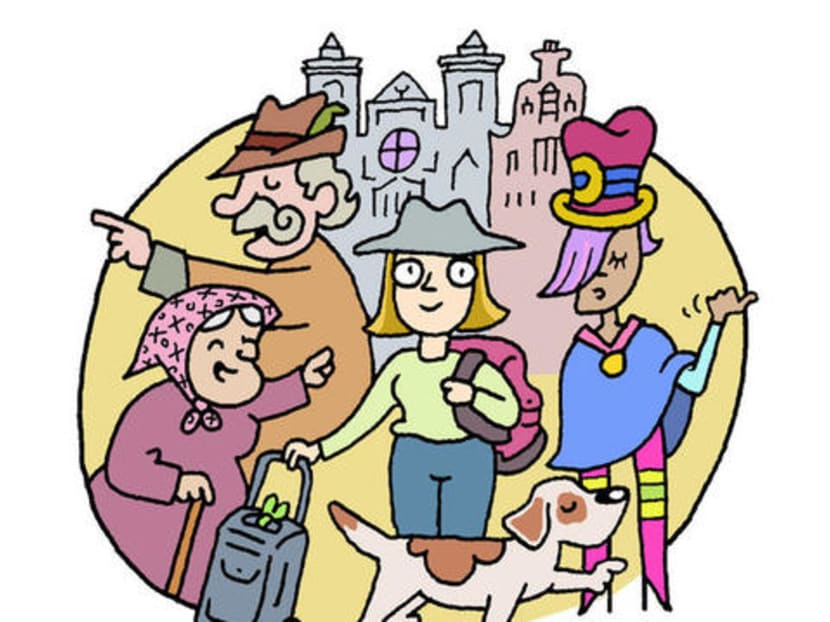
Start by choosing a place to have morning coffee or breakfast or whatever you like to start your day. After that, let strangers make every decision for you. Ask the proprietor or someone else sitting close by for a suggestion about what you should do. Go do it. If you get multiple suggestions (other people will probably chime in), you can chose one as randomly as possible, or take the one that appeals most. Every time you are ready to go to the next place, ask strangers for suggestions.
The easiest way to do this is to talk to people who are in “open roles,” like people who work in restaurants, stores or museums, anyone in a public service job, or taxi drivers. You may also be in a place where it feels comfortable to ask someone seated near you on a bench, for example, or in a cafe or at a museum. Ask where you should eat. Ask where is a good place to sit and read for a while. Ask where to buy things that are local specialties. Ask where the person’s favorite street is. Ask where she takes visitors. Ask if there’s a residential area where it would be nice to take a walk. Keep asking until you’re too tired to speak.
LISTEN.
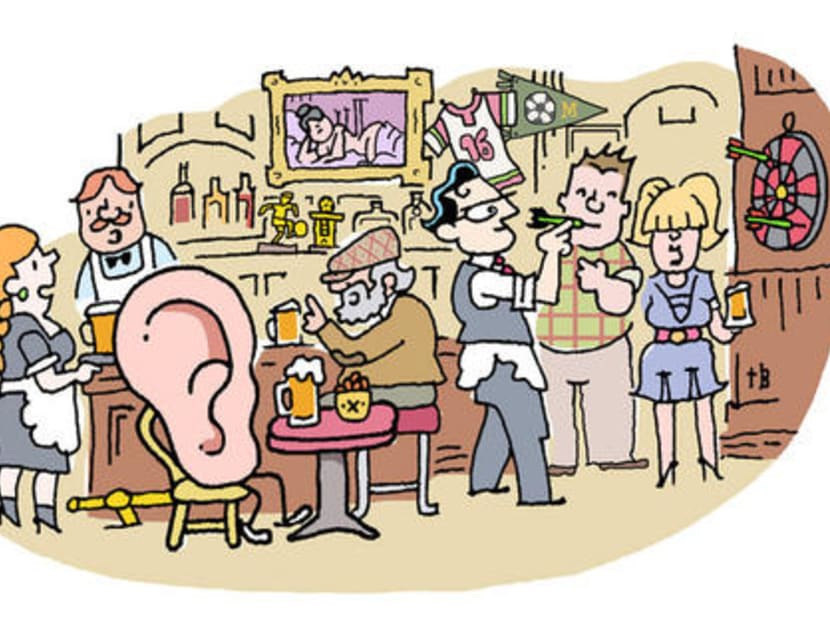
Exploring isn’t just about you. People love to tell their own stories, and you can invite that. To be truly listened to is a gift, and you can give it to someone. Not every stranger is going to take you up on it, but some people will, and their stories can make your experience of that place unforgettable.
Finding good questions to ask means observing carefully. Noticing. I thought to ask the woman on the train about newspapers because I saw she was reading one from Berlin, though she said she lived in Frankfurt. Sometimes even the most superficial question will leave an opening for a voluble stranger to start spinning stories. A well-turned question shows that you are really paying attention, that you are curious about this person as a real, special human. That you are ready to listen. A good question is a form of seduction. And like seduction’s cousin flattery, it will get you everywhere.
Your listening prowess can occasionally get you to conversational places that you would rather get out of. There are boring and uncomfortable conversations waiting for you, buried among the gems. But the fact that you’re talking to a stranger also frees you from the need to be overly polite. You can leave anytime. Here are some helpful phrases to use as you deftly move away: “I’ve got to go now, nice talking with you!”; “Oh dear, I’m late; so sorry”; “My wife/husband/friend/anyone is waiting for me; have a good day!”
Talking to strangers in your travels, however you do it, pulls you into a participatory experience of your destination’s culture and daily life and the specificity of the places where they happen. You create room for surprises. You short-circuit the disappointment that expectations and planning can sometimes cause. A trip on which you talk to strangers will be unlike anyone else’s experience of that place. Authentic, unique, memorable, and worth telling stories about. THE NEW YORK TIMES





